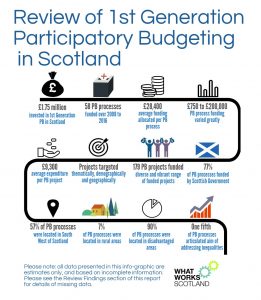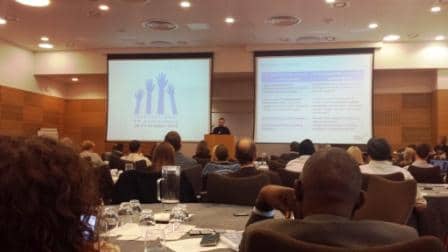
2nd Generation Participatory Budgeting… reflections on mainstreaming public participation

Second Generation PB: Reflections on key messages from the PB Conference, Scotland: by Susan Ritchie
I love this term – it’s like the phrase wave two of feminism! Marking out differences along the journey and how people change and adapt practice as they implement their thinking. I hope second generation PB will be more positive than some of the wave two feminism though!
Big thank you to Oliver Escobar for using simple terminology to show the step that is expected now with PB. And even bigger thanks to the bold and brave (then) Minister Marco Biagi who fought to get this included not only in the government’s agenda, but to put it down in the statute books: 1% of Local Authority funding must be spent using PB, and is currently being planned for across Scottish authorities.
This year’s PB conference was largely about academics and practitioners sharing their learning to help people think about how they make that leap. For me the second generation of PB phraseology is a welcome way of saying we’ve played at this thing called PB for many years, but now we need to get serious and start to adopt it as a way of strengthening and widening our democratic decision making.

Oliver Escobar addressing the International PB conference
It will require new skills, knowledge and competencies from politicians, staff and communities if it is to survive and transform the way we do political decision making over public budgets. Marco shared some of his insights in a workshop on day two with the freedom of no longer being in office, and as an academic at Yale. I have taken some of the messages in his session and shared my perspective of them below:
- To do PB you have to value democracy. Valuing democracy is (or should be!) a default position in all our politicians irrespective of party allegiance. So PB is a genuine unifying process focusing on strengthening democracy. I can confirm that over almost ten years of doing PB, it has been welcomed by Labour, Conservative, Green and SNP alike. All have their particular slant on why it is important for them but ultimately is comes down to a commitment to democratic participation and local voice.
- It’s a vote winner! The role of elected politicians has changed significantly over the years: no longer can they be elected and represent us without the expectation that they are present within their constituencies, and listening all the time in between elections. There is an expectation that communities are heard beyond the ballot box. When politicians are open to new ways of working and concede some power, the public welcome and enjoy it. It makes sense that if you empower the community they will prefer you to those politicians who restrict your voice, or don’t even ask!
- It strengthens democratic renewal: “Not everyone is open to new ways of working” argued Marco, but when you see good PB in action “it is catching”: “you need to entice them over the threshold and some really like the décor”, and indeed want to stay and make it home! They see that the effect of the PB technique has greater impact than elected representatives decision-making: it changes the relationship between citizen and state. From the many many examples of PB that I have supported across the UK I can confirm that it is often a spark that ignites an unknown passion for social justice and insight into local decision making.
- It won’t just happen: Marco reiterated the opening speeches of the conference outlining the role of national government in making this part of the way we do business in the Scotland (and hopefully the UK soon): National government must use their position to raise awareness of PB; they must use their positions to help people improve practice; and they must put their money where their mouth is to support the building of capacity across state agencies and communities. Their job is to create the conditions for PB knowing that some people won’t do it very well, but some will excel and raise the bar!
- Raise the bar and do it well: Marco quite rightly highlighted that done badly, PB can have the same effect as bad consultation or engagement: it can disengage. This is a bugbear of mine too! I hear about inexperienced practitioners training people in PB, and/or staff thinking they know better than those who have supported hundreds of PB processes. That is sometimes fear, sometimes arrogance, and sometimes a lack of resources to invest in good critical friends to help you do it well. But what we can see with the Scottish commitment to 1% is that there will be mistakes, and there will be some examples of bad practice, but with the government commitment to support and build capacity, there will be some excellent and strong examples of PB that might change the way we do democracy in between elections.
I have seen the power of PB time and time again in the first generation of PB. It never ceases to amaze me how exciting it is, and how empowering it is for those working in public service and the communities they serve.
Scotland is raising the bar for second generation PB; it is creating the conditions for a new dialogue and an empowered community; it is creating a new way of doing democracy. They have been brave and required Local Authorities to allocate 1% of their budget to this process. Let’s hope it is indeed catching and becomes the norm for the wider UK.
- Read the report on 1st generation PB that stimulated these reflections
- Watch Oliver Escobar, report author, speaking about 2nd generation PB during the International PB conference
